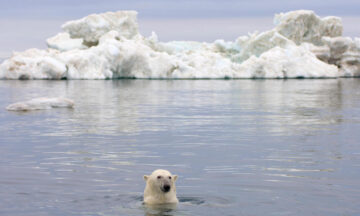Christian Sonne in Nature:

The Arctic is under stress, that much is known. Between 1979 and 2021, the region warmed four times faster than the global average, with effects — as yet poorly understood — on its ecology and ability to store carbon, on global sea levels and on wider ocean-circulation and weather patterns.
Add in the effects of biodiversity loss and pollution, and people often refer to a triple planetary crisis. I think we should actually be talking about a quadruple crisis. Since starting research in the Arctic in 1997, I have spent nearly all of my summers there, monitoring changes in pollution levels, habitats and food webs using a ‘One Health’ approach that integrates effects on wildlife, humans and ecosystems. And it’s becoming clear that, as the Arctic warms, its environment degrades and human activities increase, new health threats are emerging. In particular, the Arctic is likely to become a hotbed for zoonotic diseases that spill over into humans from other animals. That threat was brought home to all of us by the COVID-19 pandemic. We need to take seriously the possibility that the next pandemic could come from the north.
More here.
Enjoying the content on 3QD? Help keep us going by donating now.
